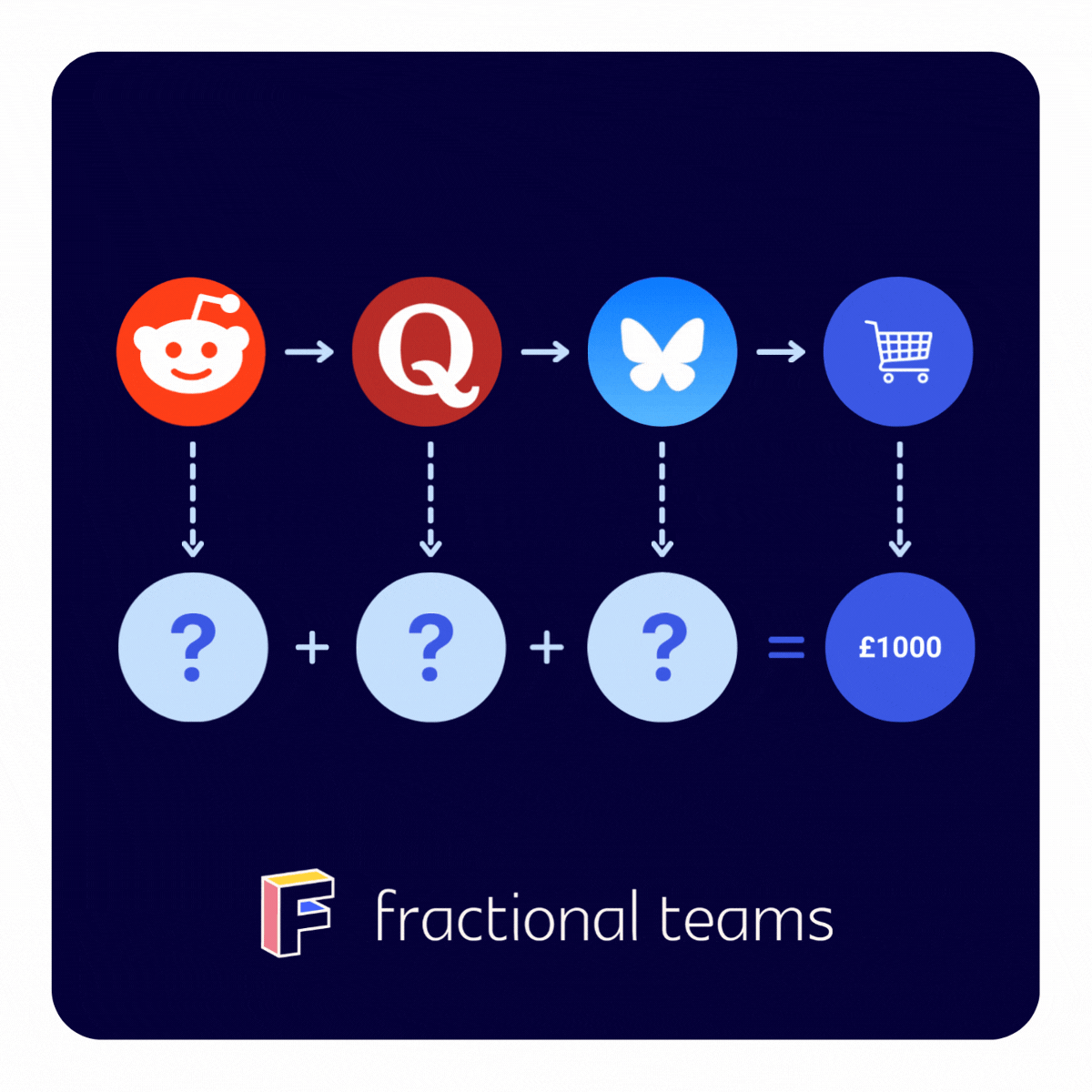Attribution strategies for unconventional marketing channels
Businesses engage with their audiences on more channels than ever before. While some platforms have become staples, think LinkedIn, YouTube and Google, others still remain an uncharted territory for many B2B marketers.
What comes to your mind when you think about, let’s say, Reddit? Probably, a community, or subreddit to be accurate, where a bunch of anonymous users discuss nonsensical, but curious, topics. For example, where Godric’s Hollow, a fictional village and a birthplace of Harry Potter, is supposed to be located in the UK. (The verdict is somewhere near Weston-Super-Mare in Somerset, in case you wondered like I did).
At the same time, Reddit was the fastest-growing social media platform in the UK, reaching more than half of online adults by June 2024. According to Ofcom, the platform experienced a 47% year-on-year increase in reach, overtaking X and LinkedIn to become the fifth highest-reaching social media service among UK adults.
While LinkedIn is getting flooded with identical content, with 54% of long-form posts likely AI-generated, discussions on Reddit tend to be unfiltered, honest, and raw. The breadth of Reddit discussions is wide-ranging and covers virtually any topic; just like promised in the company’s motto: “Dive into anything”.

The value Reddit offers for building brand awareness, generating leads, and engaging with potential clients is undisputable. However, measuring the effectiveness of these newer, often unconventional channels can be tricky, especially when it comes to marketing attribution. While traditional attribution models focus on easily trackable interactions, understanding the value of engagement on platforms like Reddit requires a more nuanced approach.
What is marketing attribution?
Marketing attribution refers to the process of identifying and assigning credit to different touchpoints in a customer’s journey that ultimately lead to a conversion or sale. Traditionally, businesses have used attribution models to understand which channels are driving revenue, allowing them to allocate resources more effectively.
For B2B marketers, attribution becomes more complex when it involves newer or less conventional channels. Such channels as Reddit or Quora don’t always fit neatly into the familiar attribution models, especially when the user journey spans across various touchpoints, with interactions spread out over weeks or months.
Which channels are unconventional channels?
Our Community Engagement Specialist, Dariia Panchenko, defines unconventional marketing channels as follows:
“Any platform or medium that falls outside the traditional and widely used marketing channels like social media (LinkedIn), paid search (Google Ads), email, and display ads. These channels typically require a more creative, experimental, and non-mainstream approach to reach target audiences. When you’re just getting started, it will feel like breaking new ground, which makes it challenging but exciting at the same time!”
Here are unconventional marketing channels that are rapidly gaining traction among B2B marketers:

Reddit: With its vast range of subreddits, Reddit provides businesses an opportunity to engage directly with highly targeted and niche audiences. It’s an ideal platform for positioning your brand as an industry thought leader, sharing valuable content, and participating in conversations that align with your brand’s expertise.

Quora: As a Q&A platform, Quora allows businesses to build trust and authority by answering questions related to their industry or field. Engaging on Quora enables brands to provide valuable insights while subtly promoting their solutions in the process.

Bluesky: A decentralised social network, Bluesky provides a fresh space for businesses to build community-driven discussions. It is particularly relevant for businesses that want to be early adopters in emerging platforms and engage with other forward-thinking professionals, who moved to Bluesky from X (former Twitter).

Challenges of attribution: How to measure the immeasurable
B2B marketers often face several challenges when trying to attribute success to these unconventional channels:
Indirect Conversions
Unlike search ads, where the path to conversion is often clear, users engaging on Reddit or Quora may come across your brand, but not immediately make a purchase. The actual conversion could happen weeks later through other channels such as direct visits, email campaigns, or even word of mouth.
No Direct Tracking
Reddit and Quora don’t offer easy-to-use, built-in attribution tools, unless you’re using Reddit paid ads. Therefore, you can’t just rely on cookies or tracking links to assess the effectiveness of a post or comment.
Brand Awareness and Trust
The goal of Reddit and Quora engagements is often to build brand awareness or credibility, not immediate sales. But how do you measure the value of increased trust, thought leadership, or brand visibility? These are vital components that are often overlooked in traditional attribution models.

How to approach attribution for unconventional channels
Given these challenges, how can B2B marketers successfully measure the impact of their activities on platforms like Reddit and Quora? Here are some approaches to help your teams and stakeholders see how unconventional marketing efforts lead to conversions.
1. Use multi-touch attribution models
One way to measure the impact of marketing efforts on unconventional channels is by adopting a multi-touch attribution (MTA) model. This model tracks all interactions a customer has with your brand across multiple touchpoints and assigns proportional value to each touchpoint along the way. For example, if a user discovers your brand through a Reddit discussion and later converts through a Google search, both touchpoints contribute to the final sale. With MTA, you can account for the indirect effect of platforms like Reddit and Quora, where engagement doesn’t always lead to immediate conversions.
2. Implement surveys and onboarding journeys
Including questions like, “How did you hear about us?” in your post-sale surveys or onboarding journeys can help you gain insights into which platforms influenced a lead’s decision to convert. Even if the direct impact isn’t visible through tracking, understanding how customers found your brand can give you a clearer picture of the effectiveness of your non-traditional marketing efforts.
3. Track referral traffic and conversions
Using custom URLs or UTM parameters in your posts can help you track referral traffic to your website. While these tools may not capture the entire journey, they can provide insights into how many people visit your site after interacting with your content. Over time, you’ll be able to see how traffic from these platforms translates into leads, sign-ups, or other conversions.
4. Analyse engagement and sentiment
Engagement may not always result in direct conversions, but tracking comments, upvotes, and sentiment analysis can provide valuable insights. If users are interacting with your posts positively, sharing your content, or recommending your services, it indicates that your brand is gaining trust and visibility. Use sentiment analysis tools to measure this influence over time and connect it to sales growth or new leads.
Understanding the value of intangible things like brand recognition, trust and thought leadership is one of the most challenging aspects of marketing. It requires a shift in mindset for marketers, and leadership, who are often keen to determine a return on investment (ROI) of each marketing effort.
“Value conversion is one of the most challenging questions for those trying to understand the economic principles of creating value from intangibles. However, the effort to convert every type of value into a common unit of measure is fundamentally the wrong approach to the intangibles economy.”
Verna Allee | Author, pioneer in value networks, intangibles, and knowledge management
At Fractional Teams, we specialise in helping businesses build and measure effective marketing strategies that leverage both traditional and new channels. If you’re ready to take your B2B marketing to the next level, we can guide you through integrating these platforms into your broader marketing strategy.
Kateryna Novozhylova
Hi! I'm Kateryna Novozhylova, co-founder at Fractional Teams. I write about product, marketing and tech.
